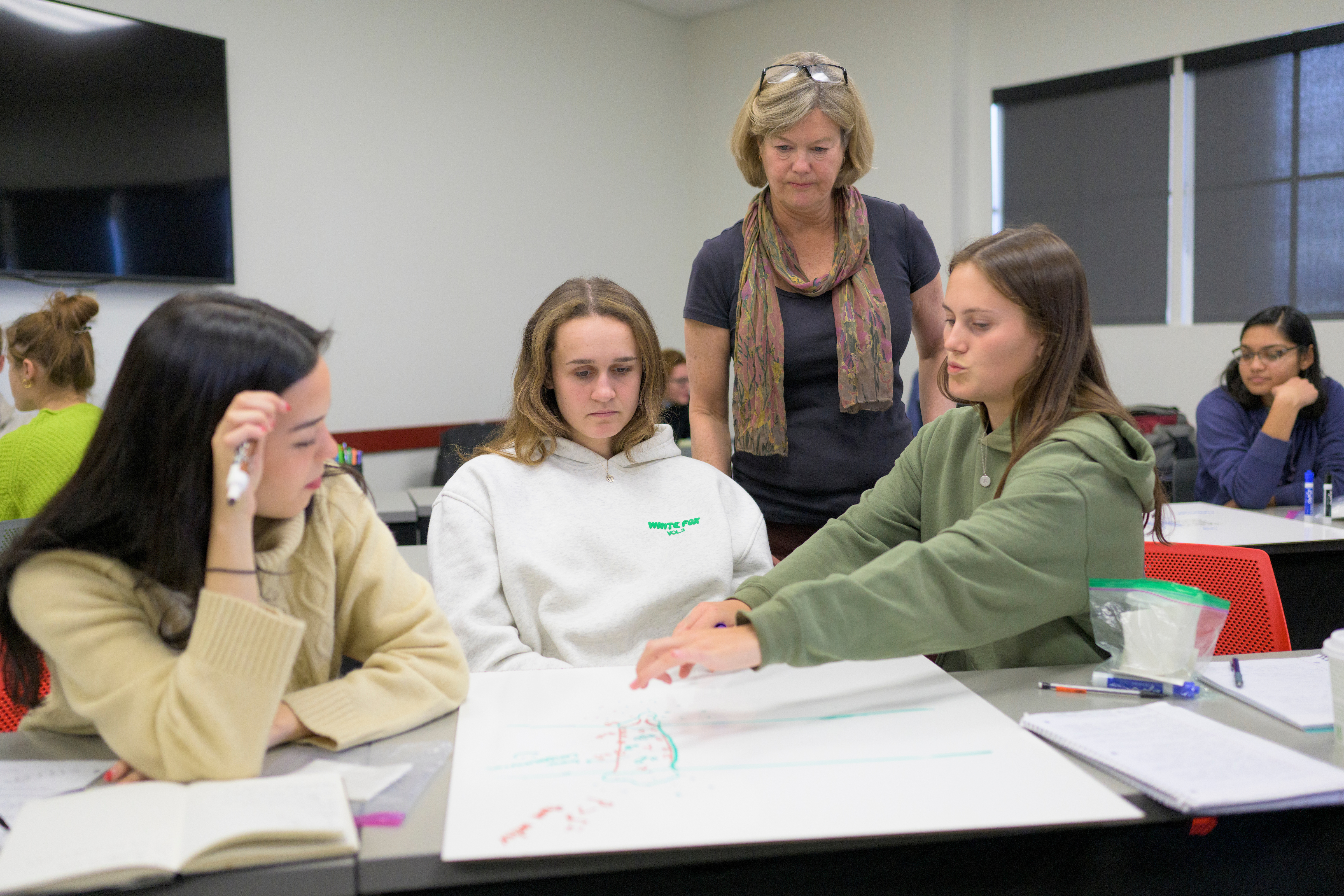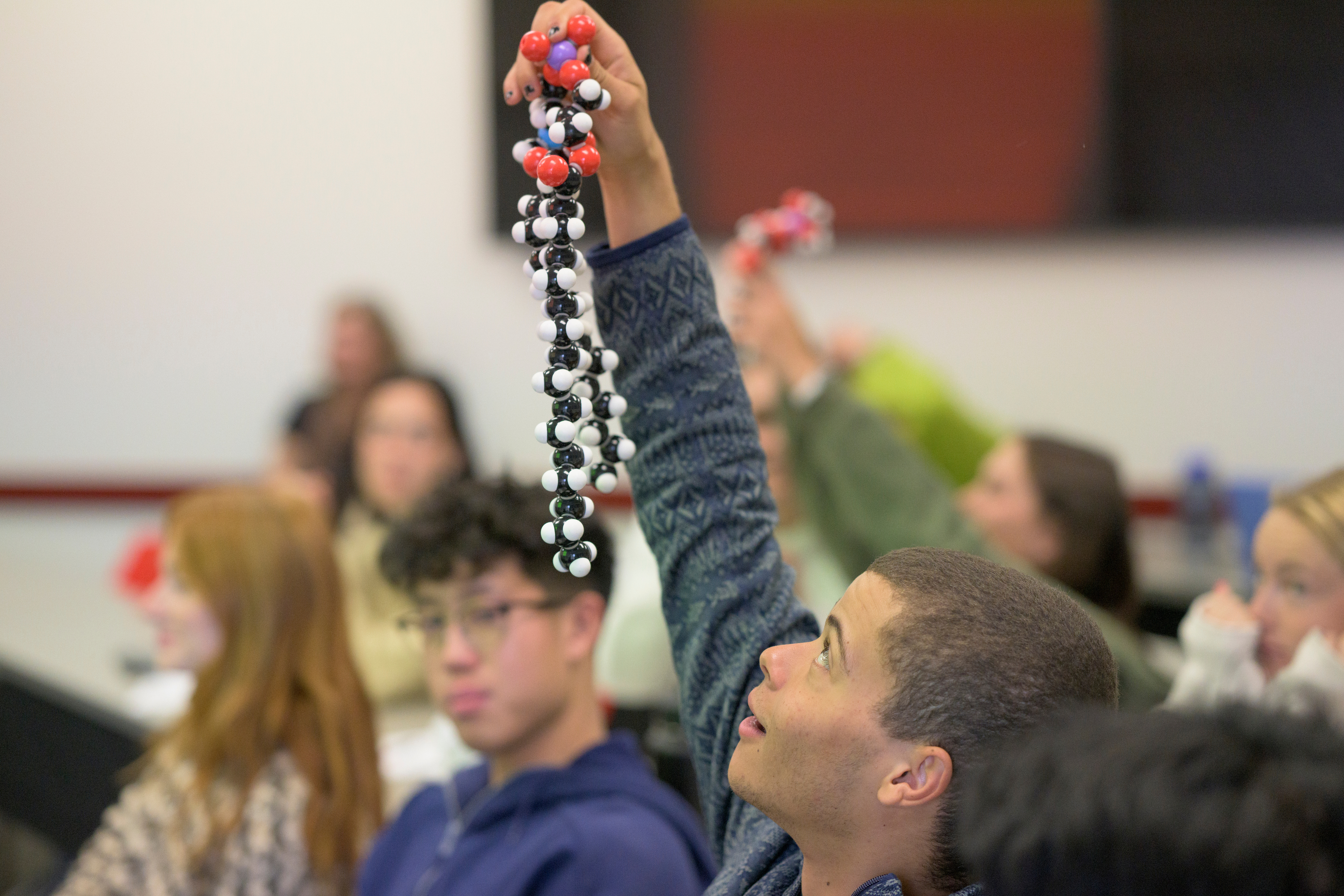

CMC offers a new innovative science program rooted in CMC’s special liberal arts mission “to prepare its students for thoughtful and productive lives and responsible leadership in business, government, and the professions.” The Kravis Department of Integrated Sciences offers two majors: The Integrated Sciences major and, in conjunction with the Robert Day School of Economics and Finance, the 3+2 Combined Program with Engineering Partner Schools.
The Integrated Sciences major is framed around three themes: Human health, the brain, and our planet. The program is designed to offer CMC students an exceptionally strong background in the sciences using innovative pedagogies and curricular design. It leverages both experimentation and computation as powerful approaches for discovery and integrates CMC’s core strengths in the social sciences and humanities.
The 3+2 Combined Program with Engineering Partner Schools allows students interested in a liberal arts education and engineering to earn two undergraduate degrees within five years, a Bachelor of Arts at CMC and Bachelor of Science degree from a partner engineering school.
For students in the class of 2028 and beyond, Integrated Sciences is CMC’s signature science major offered in the Kravis Department of Integrated Sciences. As a member of The Claremont Colleges, CMC students wishing to major in a science field other than Integrated Sciences can request a major at the Department of Natural Sciences (DNS, formerly known as the W. M. Keck Science Department), Harvey Mudd College, or Pomona College. Acceptance into those majors is determined by those programs and is not guaranteed.
CMC students in the classes of 2026 and 2027 (including transfer students) who have started taking science courses at DNS (or, in the case of transfer students, at their former institution) must complete their science major at DNS.
Below is a FAQ about our new Integrated Sciences program.
The Kravis Department of Integrated Sciences is a new program rooted in CMC’s foundational liberal arts and leadership mission, and unique in its approach to organizing science education around global societal and scientific challenges. The program leverages computation as a powerful vehicle for insight and discovery and integrates CMC’s core strengths in the social sciences and humanities.
The Integrated Sciences curriculum provides our students with deep foundational knowledge by engaging with hands-on research experiences on current and relevant global societal and scientific problems rather than traditional “textbook” problems.
Through these kinds of open-ended explorations, students gain proficiency with experimental and computational methods, develop ability to reason about the relationships between the sciences and society, and sharpen skills in communicating science to a broad audience.
The program embraces integration in three important ways:
- The science disciplines are integrated to provide students with the ability to confidently cross traditional natural science disciplinary boundaries;
- Computing and data science are integrated throughout our courses. In our new introductory science general education course, every student will learn to program in Python and use data science concepts. Students who continue in the sciences will become facile with more advanced techniques including artificial intelligence, machine learning, computational modeling, and others; and
- The connections between the social science, humanities, and the natural sciences are deeply integrated in our courses, research, and co-curricular programs.
The department is designed as a single, integrated program, with fewer barriers to interdisciplinary and multidisciplinary collaboration, and an underlying commitment to the core natural science disciplines of biology, chemistry, environmental analysis, neuroscience, and physics.
Rather than being organized around traditional natural science disciplinary units, Integrated Sciences is structured around three global societal and scientific challenges: Health, Brain, and Planet.
- Health (Genomics, Systems Biology, and Health)- the exploration of molecular data to understand the function and regulation of genes, the biological systems they control, and the development of predictive models that ultimately contribute to improving human health;
- Brain (Brain, Learning, and Decision)- the investigation of mental processes, behavior, and decision-making, including aspects of neuroscience, cognitive science, artificial intelligence, and machine learning; and
- Planet (Climate, Energy, and the Environment)- the examination of atmospheric processes and the chemical, physical, and biological aspects of climate change, and the interactions of human activities and the natural and built environments.
All three of these areas are interrelated and provide extraordinary opportunities to engage with issues of ethics, culture, policy, and economics.
Our innovative new “Codes of Life” course (SCI 10L) is the first science course for all CMC students. It serves both as the College’s new science general education course and the first course in the Integrated Sciences major. This course provides students with exposure to foundational and cross-cutting concepts in science as well as authentic research experiences on topics related to global human health, using both experimental and computational methods.
The Integrated Sciences major is organized around three grand challenges: human health, the brain, and our planet. It aims to provide students with skills and knowledge to engage in research, critically evaluate new results and emerging trends, and reason and communicate about the relationship of science and society. The program seeks to develop strong foundations in the natural science disciplines (biology, chemistry, and physics) combined with computational, data science, and experimental approaches. An Integrated Sciences major is especially appropriate for students interested in careers in the health professions, scientific research, entrepreneurship and innovation, consulting, and policy.
To best prepare our students for these challenges and develop skills and confidence in working across traditional disciplinary boundaries, the curriculum is based on a set of seven foundational courses, taken by all Integrated Sciences majors. Each of our courses is framed by one or more contemporary issues. We use a just-in-time approach that teaches new material in response to addressing a current challenge. Students immediately apply their new knowledge to make discoveries in the laboratory using a combination of observational, experimental, and computational approaches.
The content of these seven foundational courses is equivalent to 1.5 courses in biology, 2 courses in chemistry, 2 courses in physics, and 1.5 courses in computing, machine learning, and data science. The pedagogical approach of this foundational curriculum, however, involves a deliberate and thoughtful interleaving of those areas so that their deep connections are amplified and so that students can bring multiple skillsets to addressing the multidisciplinary perspectives required to address current research questions.
Beyond the seven foundational courses, Integrated Sciences majors select four elective courses. Those elective courses may be in one of the three thematic areas of our program (health, brain, or planet), providing students with depth in a single chosen area. Alternatively, students may work with their advisor to select a cross-cutting set of courses that blends the thematic areas. Students who are preparing for medical school or other health-related careers will work with their advisors to select the appropriate set of electives.
For more information on the Integrated Sciences major, please see the CMC Catalog.
The 3+2 Combined Program with Engineering Partner Schools allows students interested in a liberal arts education and engineering to earn two undergraduate degrees within five years. Students in this program study at CMC for the first three years, completing at least 24 courses toward the Bachelor of Arts degree, including 3+2 Combined Program major requirements and all general education requirement except for senior thesis. They then apply to transfer to an accredited school of engineering of their choice to complete a Bachelor of Science degree. Upon receipt of the Bachelor of Science degree from the engineering school, CMC students receive their Bachelor of Arts degree from CMC with a 3+2 Combined Program major.
The core requirements of the 3+2 Combined Program major represent a common set of requirements for admission to a variety of engineering programs. Students may choose one of two pathways within this major, the 3+2 Combined Program: Economics or 3+2 Combined Program: Integrated Sciences. Most engineering programs will require additional courses for admission to specific engineering subdisciplines. Students in the 3+2 Combined Program work with one of the 3+2 program advisors at CMC to develop a detailed individual plan of courses for their three years at CMC.
For more information on the 3+2 Combined Program major, please see the CMC Catalog.
Our program continues CMC’s long tradition of providing outstanding preparation for students who wish to continue on to medical school and other health-related careers. All of the courses that a student needs for those pathways will be offered at KDIS. Specifically, students will take 7 foundational courses, including our "Codes of Life" course, which are equivalent to 1.5 courses in biology, 2 courses in chemistry, 2 courses in physics, and 1.5 courses in computing, machine learning, and data science. Additionally, students will typically take courses in biochemistry, organic chemistry, and a biology elective as 3 of their 4 required elective courses. Our program also offers robust research opportunities and pre-health advising.
Graduates of the Integrated Sciences major will be well-prepared for a broad array of post-graduate pathways, such as, employment in industry, medical school, and advanced graduate work in a variety of disciplines. Examples of careers include roles at biotech companies, environmental consulting firms, national laboratories, federal agencies, NGOs, and many others. Medical schools, as well, are increasingly encouraging applications from students with such interdisciplinary science backgrounds. Finally, our students will be well-prepared for many rapidly growing multidisciplinary graduate programs, including integrative and systems biology, dynamical neuroscience, and computational earth, atmospheric, and planetary sciences.
Graduates of the 3+2 Combined Program will be well-prepared for employment in industry, as well as for advanced graduate work in various engineering disciplines. Examples of areas of specialization include mechanical engineering, computer science, financial engineering, biomedical engineering, civil and environmental engineering, and operations research. Graduate engineering programs especially seek students who have multidisciplinary backgrounds, such as those formed by the 3+2 Combined Program, to meet the needs and complexities of future research challenges.
The program responds to a growing need for innovative and compelling science curricula for all students, regardless of their major. This includes a “common on-ramp to the sciences,” through general education courses and creating meaningful conversations around the impact of science on society – for instance, in cross-disciplinary areas such as neuroeconomics, climate policy, bioethics, science journalism, and ethics.
The Kravis Department of Integrated Sciences is housed in the new state-of-the-art Robert Day Sciences Center. The iconic design by world-renowned architects at BIG-Bjarke Ingels Group, provides extraordinary laboratory and teaching spaces and a welcoming and warm environment for collaborations between all members of our community.
Please contact the founding chair, Professor Ran “Ron” Libeskind-Hadas.
